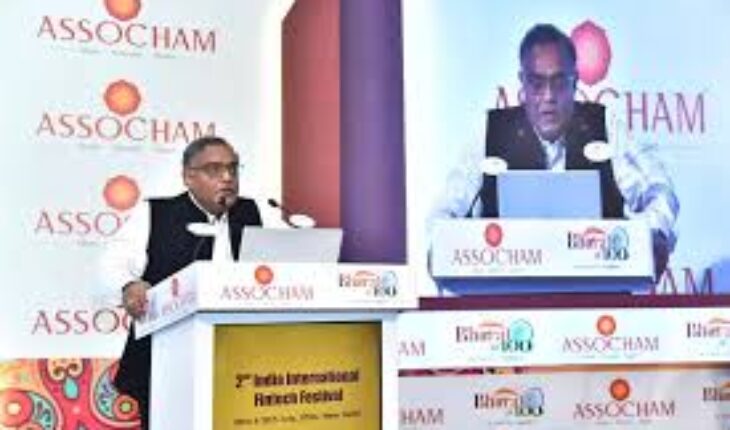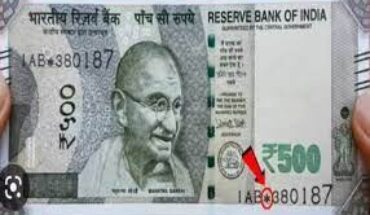New Delhi : ASSOCHAM 2nd India International Fintech Festival, a two-day event with the theme, Powering India’s $5tn economy by fostering innovations, enabling inclusion and building a sustainable future, Innovation, Inclusivity and Sustainability was kicked-off today at New Delhi.
Speaking at the inaugural session, Ajay Kumar Choudhary Non-Executive Chairman and Independent Director, NPCIsaid, “As of 2024, Indian FinTech Industry is estimated to be around $ 110 billion and by 2029, it is projected to reach an impressive number of around 420 billion at a cumulative annual growth rate of 31%. Boasting over 9,000 FinTech entities, India ranks third globally in terms of the highest number of FinTech entities and commands 14% of start-up funding in the country. The adoption rate of FinTech in India is 87%, which is much above the global average of 67%.”
“The Indian fintech ecosystem is expected to continue to proliferate, driven by factors like favourable policies, development and existence of enabling DPIs, institutional support, and technological innovations. The government’s push towards a digital economy, coupled with a young and tech-savvy population, is likely to propel the fintech sector to new heights. NPCI has also set an ambitious target of achieving 1 billion UPI transactions per day in the coming years.
The advent of the FinTech ecosystem, driven by technology-linked innovation, has revolutionized traditional financial services and led to improvement in the efficiency of delivery of financial products and services. However, these innovations have come with their own set of risks and can create new vulnerabilities and amplify existing risks. The sector would have to focus on two key elements, viz. Customer centricity and governance. By bringing customers right at the centre of innovation and following the standards of good governance, the true and natural balance can be achieved. Sustainability of sector would largely depend on how the sector balances its own wants against the need of customer centricity and good governance. In this context, the role of the Self-Regulatory Organisation (SRO) assumes importance in the Fin Tech sector. Emphasis is also needed on creating adequate IT investments by banks as well as FinTech entities to meet the evolving challenges of digitalisation.
Transformative potential of Fintech and Fin Tech entities extends beyond the financial sector and has the power to propel our economy to new heights. The Indian government’s vision of a $5 trillion economy is within reach, and fintech entities will play a crucial role in achieving much beyond this if they pursue principles of responsible innovations and sustainable development.” He added.
In her keynote address Archana Vohra, Managing Director, Google said, “UPI is not just a set of tech rails, it is an infinite amount of work to make sure that making digital payments is easily accessible. It is important for interoperability to be true in letter and spirit. It has been amazing to see the economic enablement and the ecosystem enablement that has come with UPI. Fintech products need to be built for scale and for a vastly different cohort of users. Everybody doesn’t use an app exactly the same way. It is important for us to realize the nuance of India and solve for this locally. What brought us here will not take us ahead, so we need to be persistent, resilient, and make sure that the next 10 to 15 years help us go deeper into the fintech space.”
Vikas Verma, COO, Mastercard, said “Access to credit is one of the fundamental catalysts that is propelling India towards its Viksit Bharat vision and FinTechs can enable access to credit for the underserved segments of our society. Today only 14% of MSMEs have access to any formal form of credit. In agriculture, just one in four farmers have access to any formal source of credit and this is after 70 years of our Independence. A lot of financial work and the foundational rails have been laid by the government, and this is an opportune time for the fintech sector to get involved in key sectors such as the farm sector, the MSME sector, and empowerment of women, where they can drive commercial success for themselves, as well as be able to contribute to nation building.”
Aman Jain, Director, Public Policy, Amazon India in his address said, “Smartphone penetration, growing internet access and the government’s commitment to financial inclusion would contributing towards about $10 trillion in overall digital payments volume in India by 2026. While 60% of millennials and GenZ prefer digital payments, digital payments have also penetrated small towns underscoring the immense potential for growth and inclusion as FinTech solutions become more accessible to consumers. With the government, regulators and FinTech industry working together can strengthen India’s position as a global leader in the FinTech and digital payments space.”
Anand Vijay Jha, Chairman, ASSOCHAM Fintech Council in his address said, “The growth of any sector comes from the innovations of its stakeholders. Raising fund has become a challenge globally and not just for those in the FinTech sector. We need to be much more focussed on delivering values to attract investors to the ecosystem. India’s strong position in digital public infrastructure is rooted in public private partnership. With multiple stakeholders in the ecosystem, the role of policymakers and regulators assumes greater significance.”






